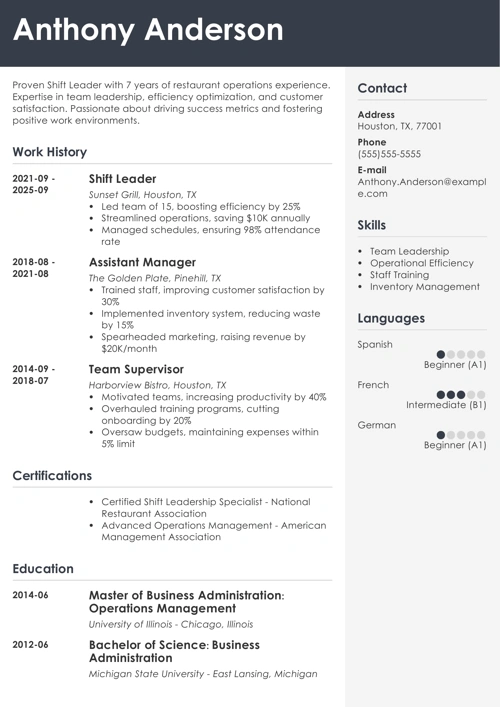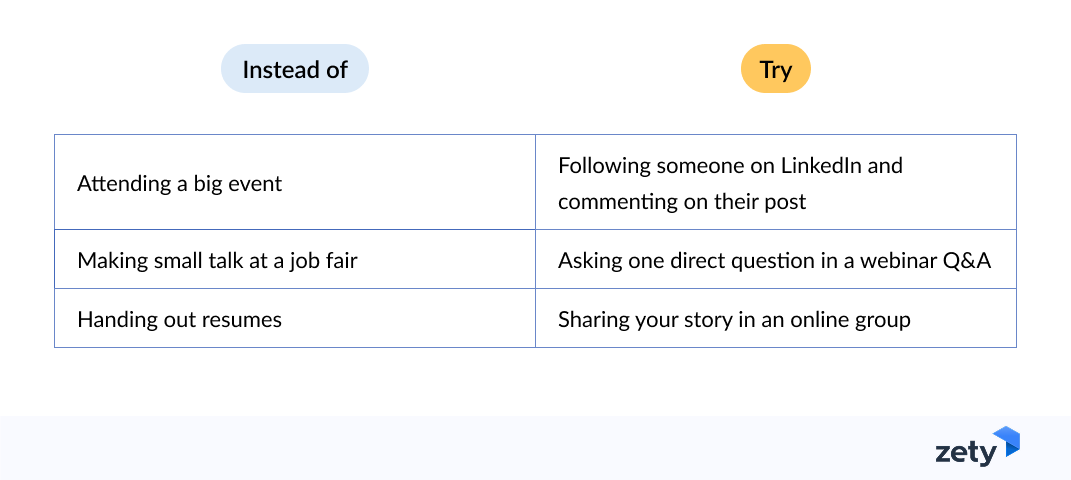
Everyone deserves the chance to find a job where they can shine. For neurodivergent people, that means a workplace that plays to their strengths and thrives on creative thinking.
Neurodivergence refers to when someone’s brain works differently than what’s expected. This can include people on the autism spectrum or with ADHD, dyslexia, and other ways of thinking or learning.
Being neurodivergent isn’t wrong or broken—it’s simply different. And difference can be a strength.
Neurodivergence in the workplace is gaining visibility, and people are talking about how it makes teams better. That’s a big step forward. Still, many neurodivergent people face barriers when trying to find jobs or feel included at work.
This guide is here to help. You’ll find useful tips on:
- Creating a resume that showcases your strengths
- Writing a cover letter to share your story
- Finding a job where your talents can stand out
- Connecting with employers that value diversity
- Preparing to ace your interview
- Advocating for yourself in the workplace
You have unique skills to offer. And with the right support, you can find a job where you can grow, succeed, and be yourself.
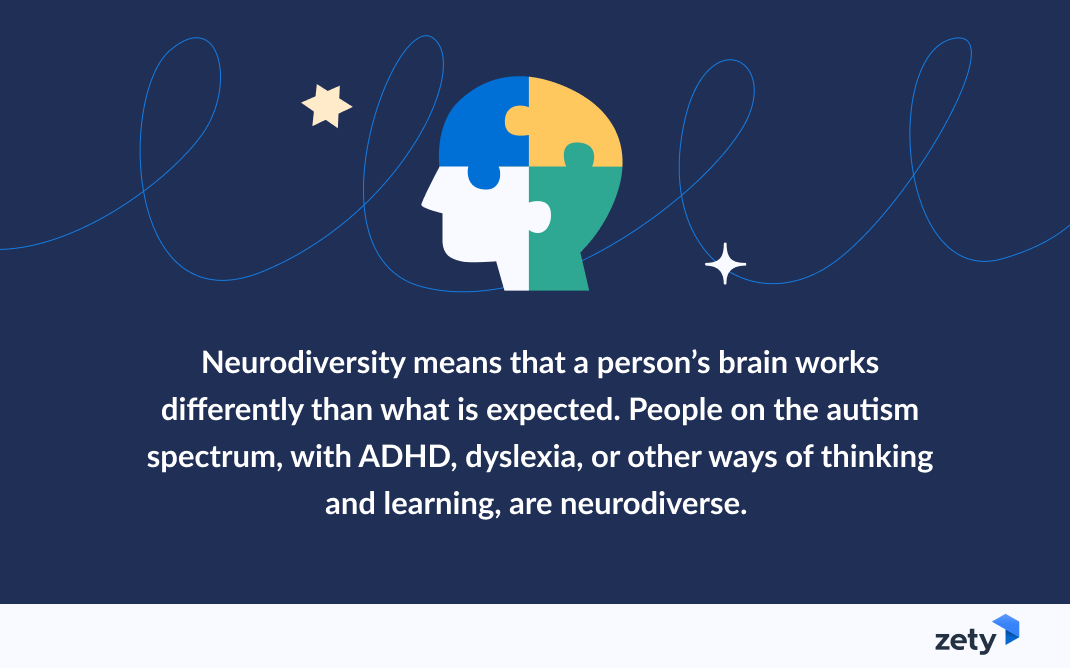
Creating Your Standout Application
Your job application is your chance to show how you think, work, and solve problems—your way. You may bring creativity, focus, deep knowledge, pattern recognition, or out-of-the-box problem-solving. These are powerful strengths, even if they don’t always show up in the “usual” ways.
Let's explore ways to share what makes you, you, in your resume and cover letter—and how that could be just what an employer is looking for. You get to choose what to include and how to frame it. This is your story.
Resume essentials: highlighting your assets
Creating your resume doesn't have to be a daunting task. It's all about playing to your strengths and showing employers that diversity benefits the team. Follow these tips to boost your resume:
- Reframe your experience: Not all valuable work experience comes from traditional job roles. Talk about your projects, volunteering, hobbies, or personal systems you've created. The key is showing you can apply this knowledge to your dream role.
- Highlight skills often overlooked: Skills like hyperfocus, deep knowledge of a topic, pattern spotting, and innovative problem-solving may not always show up in traditional job descriptions, but they're real assets. Show where you've used them to get things done.
- Structure your document to work for you: Try going for a skills-based resume to showcase your strengths. Consider color coding or visual formatting if it helps you stay organized. This is your document; make it reflect how you think and work best.
- Explain gaps or challenges: You don't need to hide gaps in your work history. You can briefly mention career pauses as times of learning, managing health, or developing skills. It's okay to be honest and proud of how far you've come.
- Lean on transferable skills: Employers value adaptable workers. Think of what you've done in the past and how that can apply to your new role. If you coded your own game or built a detailed spreadsheet to organize your life, that shows organization, attention to detail, and technical skills. Include them!
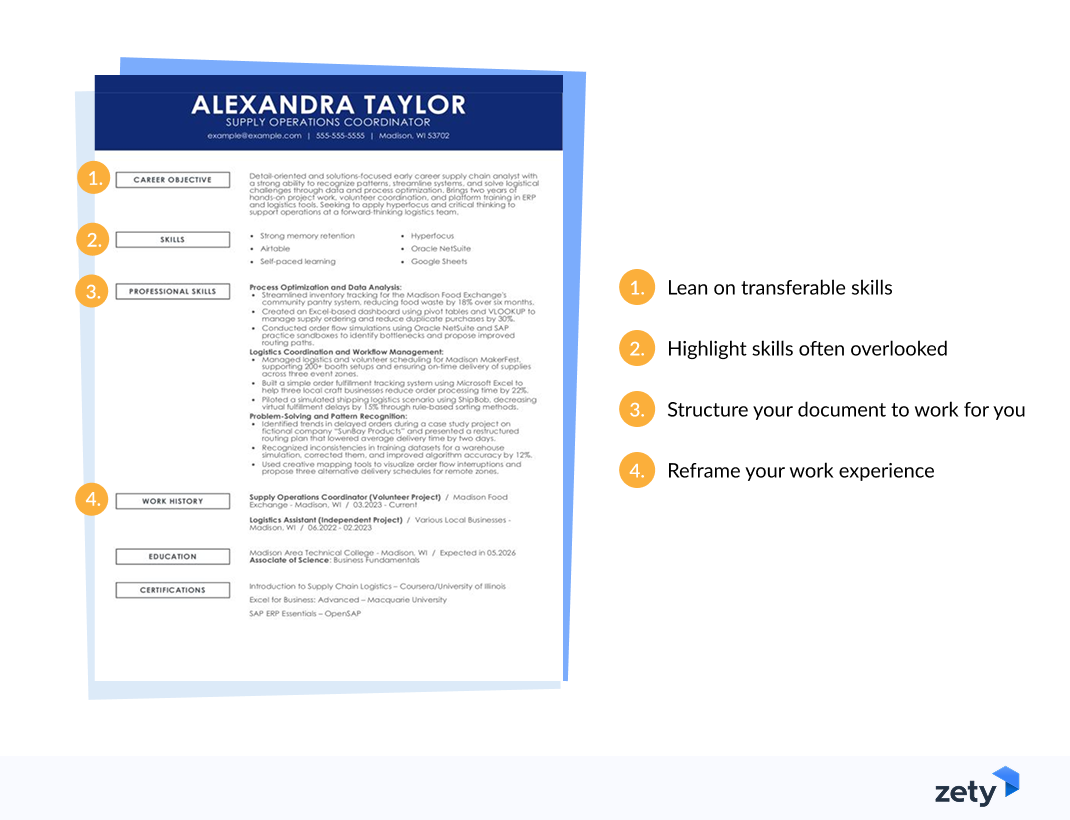
A cover letter that tells your story
Your cover letter is your chance to speak directly to the employer. You can show them what makes you excited about the job and why you’d be a great fit.
For neurodivergent job seekers, it can be a way to highlight the unique ways you think, solve problems, and get things done.
This isn’t about explaining your diagnosis. It’s about helping the employer see your strengths—the ones that might not fit into a traditional box, but are exactly what many workplaces need.
See how you can make your cover letter work for you:
- Start with what drives you: What drew you into the job? Neurodivergent people often have strong interests or deep focus areas—this is a great place to mention them.
"I've always loved diving deep into complex systems and finding ways to make them work more smoothly, which is why your operations role stood out to me."
- Highlight how you work best: If you have ways of working that are different from the norm, but effective, feel free to share those.
"My strong attention to detail and ability to focus intensely on tasks have helped me consistently meet deadlines and spot issues early."
- Talk about your strengths in your own words: Avoid buzzwords if they don't feel right. Use language that makes sense to you, even if it's informal, especially if it helps you sound confident.
"When I'm interested in something, I give it 100%. I learn fast, think creatively, and work hard to do it right."
- Mention accommodations (if you choose): If you need adjustments and want to set the tone early, you can do so simply and respectfully.
"I thrive in structured environments and appreciate clear expectations. I'm happy to talk about any support that would help me do my best work."
- End with confidence: Close your letter by circling back to your interest, and reminding them that you're someone who brings value.
"I'd love the chance to bring my focus, creativity, and love of learning to your team."
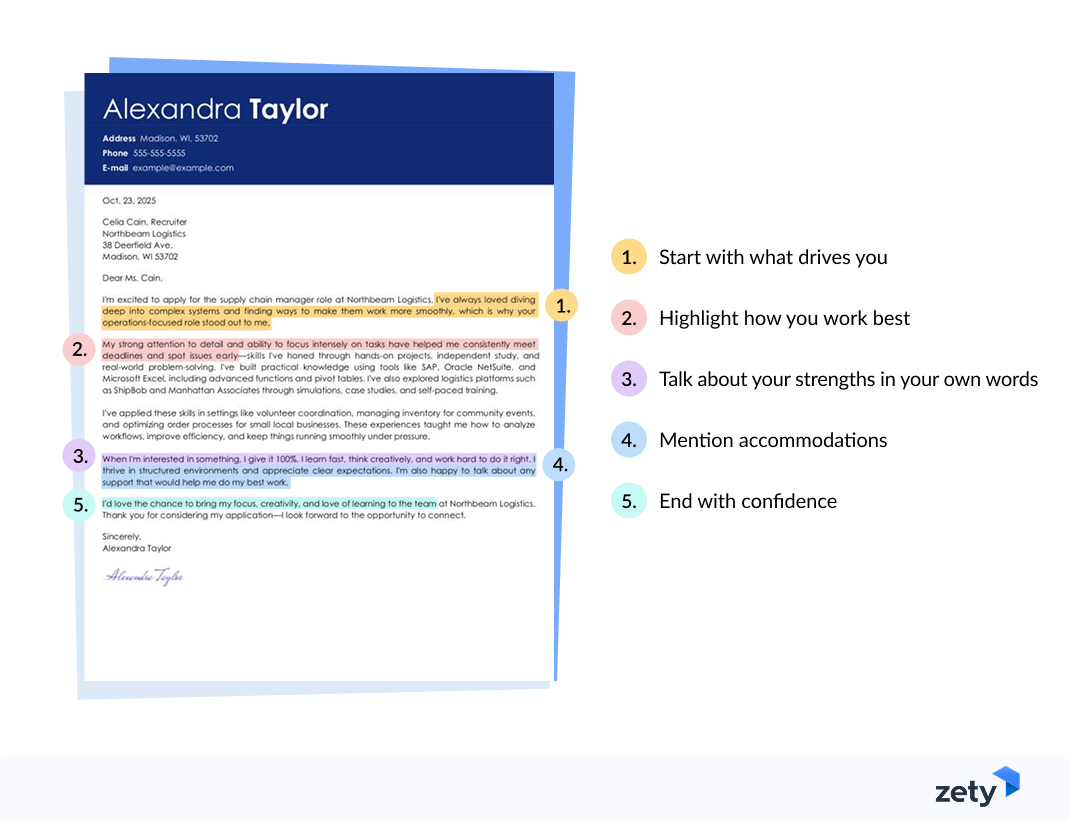
Target the Right Opportunities
Finding a job that fits is challenging for most, whether neurotypical or neurodiverse. There's no one-size-fits-all. You shouldn't feel like your options are limited to roles typically suggested for neurodiverse people.
It's all about knowing your strengths, what you enjoy doing, and your ideal work environment. Then, you can target job positions that feel right for you.
Finding roles that align with your strengths
If you're neurodivergent, you might thrive in work conditions that let you focus deeply, move around more, follow routines, or think creatively. You deserve a job that plays to your strengths—not one that forces you to “mask” or pretend to be someone else.
Here are four ways to explore neurodivergent careers that fit you:
Start with your strengths, not job titles
Think about what you do well and what you like to do. Then look for jobs that use those skills—even if the job titles aren’t what you expect. Skills can apply to many roles with different names, so don’t limit your search to familiar labels.
This approach shifts the focus from "fitting in" to "finding fit". You're choosing work based on how you operate best—something that’s valuable when researching jobs for neurodivergent adults.
Ask yourself:
- What am I really good at?
- What do I like doing for fun?
- What do others say I'm great at?
For example:
- If you love working with numbers and notice details others miss → Data entry, bookkeeping, quality control
- If you love helping people solve problems → Tech support, customer care, peer mentoring
Explore neurodivergent-friendly fields
Some jobs or industries are naturally more flexible, structured, or open to different ways of thinking. These environments may already have processes or cultures that support neurodivergent workers.
Here are a few jobs for people with autism and ADHD:
- Tech & IT: Values deep focus, pattern recognition, and independent work
- Creative fields (writing, design, animation): Embrace unique ideas and nonlinear thinking
- Libraries or archives: Offer quiet, organized spaces and systems
- Manufacturing or lab work: Involve repeatable, task-focused work
- Self-employment: Allows full control over your environment and schedule
Choose the right environment, not just the right job
Sometimes the job is fine, but the workplace isn't. Pay attention to what kind of setting helps you succeed. Matching your sensory, social, and communication needs to a work setting helps avoid burnout and boosts confidence.
Think about:
- Do I work better in quiet places or active ones?
- Do I like rules or flexible routines?
- Do I prefer working alone or with others?
For example:
- You may enjoy customer service, but only if the environment is calm and structured (like a library desk, not a busy restaurant).
- You may be a great writer, but you prefer freelancing from home rather than working in a noisy office.
Use your special interests or passions as a clue
Many neurodivergent people have strong interests in specific topics. These can lead to jobs that feel meaningful and engaging. Working with something you enjoy builds motivation and can help you stand out as a knowledgeable, passionate candidate.
For example:
- If you love trains, logistics, or transportation → roles in shipping, warehouse operations, or transportation planning
- If you love animals → working in pet care, veterinary clinics, shelters, or animal training
Exploring remote, hybrid, and in-person options
Everyone thrives differently. As you explore jobs for autism and ADHD, consider both the work format and the amount of work that feels right for you—full-time, part-time, or freelance.
Remote jobs
These jobs are done on a computer or phone, at home or anywhere quiet. You can work in a space that feels safe and comfortable for you.
If you enjoy working alone, find it hard to focus in loud spaces, or need breaks to stay focused, these remote jobs for people with autism and ADHD may be right for you:
- Data entry
- Writing or editing
- Virtual assistant
- Tech support
Hybrid jobs
With hybrid roles, you go into the office some days and stay home other days. You get both quiet time and connection with others.
If you like structure, but want freedom as well, consider these jobs:
- Graphic designer
- Marketing assistant
- IT support
- Office jobs with flexible schedules
In-person jobs
Some people perform better when work and home are in different places. Clear routines and physical tasks are valuable traits to mull over when searching for your ideal job.
If you enjoy moving around or working with your hands, these may be a good fit:
- Warehouse work
- Animal care
- Retail
- Cleaning or maintenance
Connect With Inclusive Employers
Studies suggest that about 15 to 20% of the workforce is neurodiverse. Now more than ever, inclusive employers are a must. These are employers who understand and value diversity in thinking, working, and learning.
Inclusive employers care about making everyone feel safe, respected, and supported, including people who are neurodivergent. You deserve to work somewhere that values you for who you are.
Let's discuss how you can make that happen.
Identifying neurodiversity-friendly companies
Searching for a job also means vetting companies to see if they're neurodiverse friendly. Here's a few tips to try:
Look for clues in job posts and company websites
Mentions of "inclusion" or "diversity” or statements like "We welcome candidates from all backgrounds” signal that the company may have policies in place to promote an inclusive environment. Information about accommodations or flexible work options in job postings let you know that employers are seeking a diverse candidate pool.
Use job boards that focus on inclusion
Some websites focus on helping job seekers find roles for people with disabilities from employers who care about equity and accessibility. These sites help you skip companies that might not be ready to support you, and connect you with ones that are.
You can try:
Ask questions in the interview (if you feel safe doing so)
You don't have to share anything personal. If you feel comfortable, you can ask questions that tell you how the company treats people. For example:
- How does your team support different work styles?
- Are there flexible options for how people work or communicate?
- How do you create an inclusive environment?
Talk to others (if you can)
You can learn a lot by hearing from people who already work there. Their experiences can help you avoid harmful workplaces and find supportive ones faster. Try:
- Reading reviews on sites like Glassdoor
- Joining online groups for neurodivergent professionals
- Asking friends or job coaches if they've heard good things
Networking tips for meaningful connections
Think of networking as relationship-building. It’s about finding people who get you—people who can offer encouragement, share advice, or help open doors.
Whether you’re exploring the best careers for ADHD, researching industries that support autistic adults, or just trying to land your next role, having a support network can make a big difference.
Start with small, low-pressure connections
Begin with people you already know and trust. Consider reaching out to a teacher, a friend, or a past coworker. Try saying something like:
"Hi! I'm looking for a job and wondering if you could tell me how you started working in your field."
You're not asking for a job, you're asking for advice.
Join neurodivergent-friendly groups
Look for professional associations or online communities built for or inclusive of neurodivergent individuals. These spaces often offer peer support, mentorship, and job leads. You can ask for advice without the pressure to mask or perform.
Try these options:
- Neurodiversity in the Workplace (NDIW): A program that partners with companies to support autistic and ADHD job seekers
- Autistic Women and Nonbinary Network: A nonprofit committed to providing community support and resources for autistic adults of marginalized communities
- ADHD Professionals: A community within the Attention Deficit Disorder Association (ADDA) offering networking and professional development opportunities for adults with ADHD
- Disability:IN: A nonprofit partnering with leading companies to drive inclusion through initiatives and organizational tools
- Reddit for job seekers with ADHD: A social media platform offering communities who can support your job search in subreddits like “r/ADHD_Programmers” and “r/ADHDJobs”
- Forums for autistic job seekers: Platforms like “Wrong Planet” and “Neurodivergent Rebel” on TikTok or Instagram with forums that can support you
Connect with recruiters on your terms
Recruiters can be valuable allies. Especially those who understand the strengths of neurodivergent job seekers. When reaching out, be clear and specific. You can say:
"Hi! I'm looking for jobs in [type of work] and I'm interested in companies that support neurodivergent people. Can I ask for some advice?"
You can also look for hashtags like #NeurodiversityAtWork to find the right people.
Reframe outreach as mutual support
You don’t need to be “charming” or “extroverted” to make meaningful connections. The most effective networking comes from being curious, respectful, and honest. Here are a few ways to reframe networking actions:
Be yourself
You don’t have to be perfect to make real connections. Share what you love and what you’re good at. People will remember your passion more than your polish.
Building a network is like planting seeds—you don’t need to meet 100 people overnight. Start small. One message. One group. One new connection. Over time, your support network will grow.
Showcase Your Unique Value During the Interview
Everyone has something special to offer. The key to acing your job interview is understanding what makes you unique and how to frame it. Employers will value your honesty and commitment to getting the job.
Understanding your neurodivergent strengths
If you are neurodivergent in any way, you likely have strengths that help you work in powerful, creative ways.
Take a moment to think about what you’re really good at. For example:
- Do you notice small details others miss?
- Do you focus deeply on tasks you enjoy?
- Do you think of creative or different ways to solve problems?
- Do you love learning everything about a topic you care about?
These are all great strengths to talk about in a job interview. Employers want to know what you’re good at—not what you struggle with.
Communicating your abilities to employers
You don’t have to talk like everyone else. You can share your skills in a way that feels honest and comfortable. Try saying things like:
“I work best when I know what’s expected. I like clear steps and goals.”
“I’m very focused when I care about something. I enjoy solving problems and doing things the right way.”
If you need support to do your best, that’s okay to say too. For example:
“I do best in quiet spaces or when I can take short breaks to refocus.”
You’re not asking for special treatment, you’re sharing what helps you shine.
Deciding to disclose your neurodivergency
It's your choice to disclose that you're neurodiverse in an interview. Disclosing to the employer could help when requesting accommodations or changes, and let you be who you are. However, you may choose not to disclose because you want to focus on your skills or you prefer to wait until after you're hired.
There's no right or wrong answer. What matters is what feels helpful for you. Some people tell right away, some wait until they're hired, and some don't share at all. All of those choices are valid.
Advocate for Your Success
Self-advocacy is a critical part of your journey to success. Having the confidence to speak up for yourself will help you grow professionally while making your experience more enjoyable.
Knowing your rights and requesting accommodations
Sometimes it's not about finding the perfect job, but creating a workplace where you can do your best. Asking for accommodations will help make the work more fair and comfortable. For example:
- A flexible schedule, so you can take breaks when needed
- Noise-cancelling headphones or a quiet space
- Written instructions instead of only verbal ones
- Extra time to learn new tasks
- Remote work or a calm work area
These kinds of support are protected by law. In the U.S., the Americans With Disabilities Act (ADA) says that workplaces must give “reasonable accommodations” if you need them because of a disability, including neurodivergent conditions.
👉 You don’t have to share your diagnosis to ask for help. You can just say what you need to do your job well.
Building confidence in self-advocacy
It can feel hard to ask for what you need, especially in job interviews or at work. But self-advocacy means learning how to speak up in a way that’s honest, clear, and respectful.
You don’t have to do it all at once. Here are some small ways to build confidence:
During interviews:
- Practice saying your strengths out loud before the interview.
- Write down things you want to say or ask.
- Use phrases like: “Here’s how I work best…” “This is a strength of mine…” “Here’s what helps me stay focused…”
In the workplace:
- Ask for help when you need it—this shows you care about doing the job well.
- Share how you like to communicate (email, meetings, short check-ins).
- Notice what environments or tools help you stay calm and focused.
With your team:
- Tell teammates what you’re good at and what kind of support helps.
- Be honest if something isn’t working, and offer ideas for how to fix it.
- Remember: good teams include all kinds of brains and working styles.
Neurodivergency at work means learning how you perform best, and helping others understand how to support you.
Key Takeaways
We covered everything from creating your job application to advocating for yourself in the workplace. Now, let's go over key points to remember:
- Neurodivergence is a difference in functioning, not a weakness. These differences can enhance creativity, problem-solving, and team performance.
- Opt for creating a resume that shows real-world strengths, not just traditional experience.
- Use your cover letter to explain how you work best, what motivates you, and why you're excited about the role.
- Tailor your job search around your skills and strengths, not job titles.
- Work environment matters as much as the work itself. Remember to consider your needs when evaluating a job fit.
- Seek out companies that actively support neurodiversity in the workplace.
- Networking can be as simple as joining online communities or messaging a mentor.
- Your interview is a chance to highlight your unique ways of thinking. Share how your brain works and what work conditions help you thrive.
- Knowing your rights is critical. Remain true to yourself and ask for accommodations that empower you to perform your best.
Frequently Asked Questions
What is the best job for a neurodivergent person?
There’s no one “best” job for all neurodivergent people because everyone is different. The best job is one that fits your strengths, interests, and work style. Some people do well in creative jobs, others like routine or quiet spaces. The key is finding a job that lets you be yourself and do work you enjoy.
What do neurodivergent people do for work?
Neurodivergent people work in all kinds of jobs—tech, art, education, healthcare, retail, and more. Some work full-time, part-time, or freelance. Many choose jobs that match their thinking style, like focusing deeply, noticing patterns, or solving problems in new ways. Like anyone else, they succeed when they’re supported and respected.
What jobs are best for ADHD people?
People with ADHD often do well in fast-paced, hands-on jobs or creative roles where they can move around and stay busy. Examples include graphic design, emergency services, sales, trades, or entrepreneurship. Flexible schedules and tasks that keep them engaged can really help ADHD workers shine.
What are the best jobs for autistic adults?
Many autistic adults thrive in jobs that are structured, quiet, and focus on details or routines. Roles like data entry, library work, quality control, IT, lab work, and shipping or warehouse jobs are great examples of the best careers for autistic adults. Creative fields like writing, design, or animation can also be a great fit—especially when employers respect their communication style and sensory needs.


